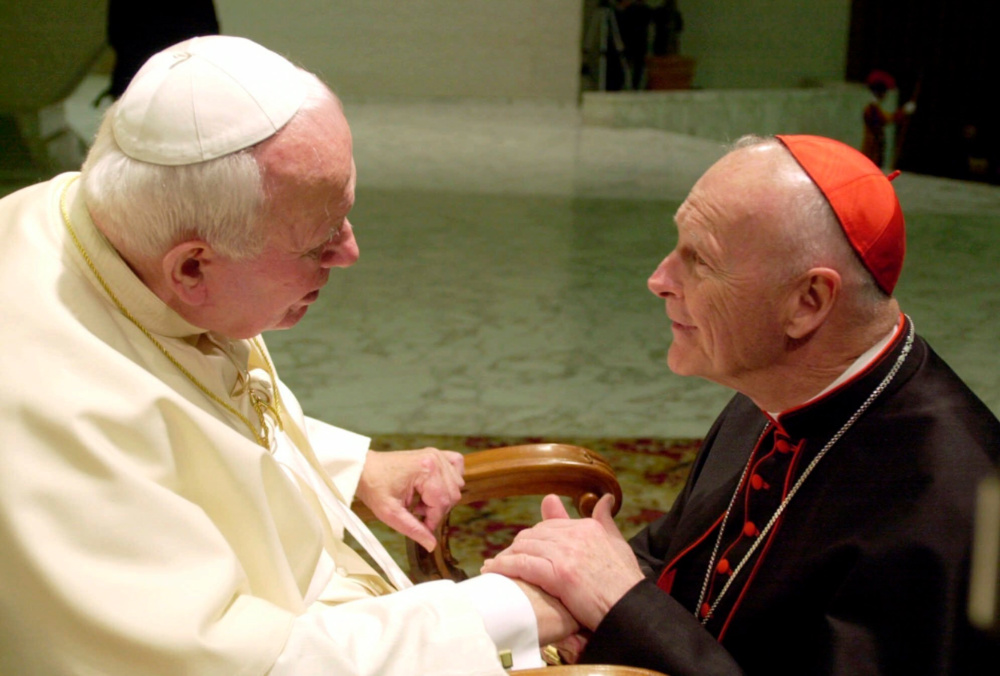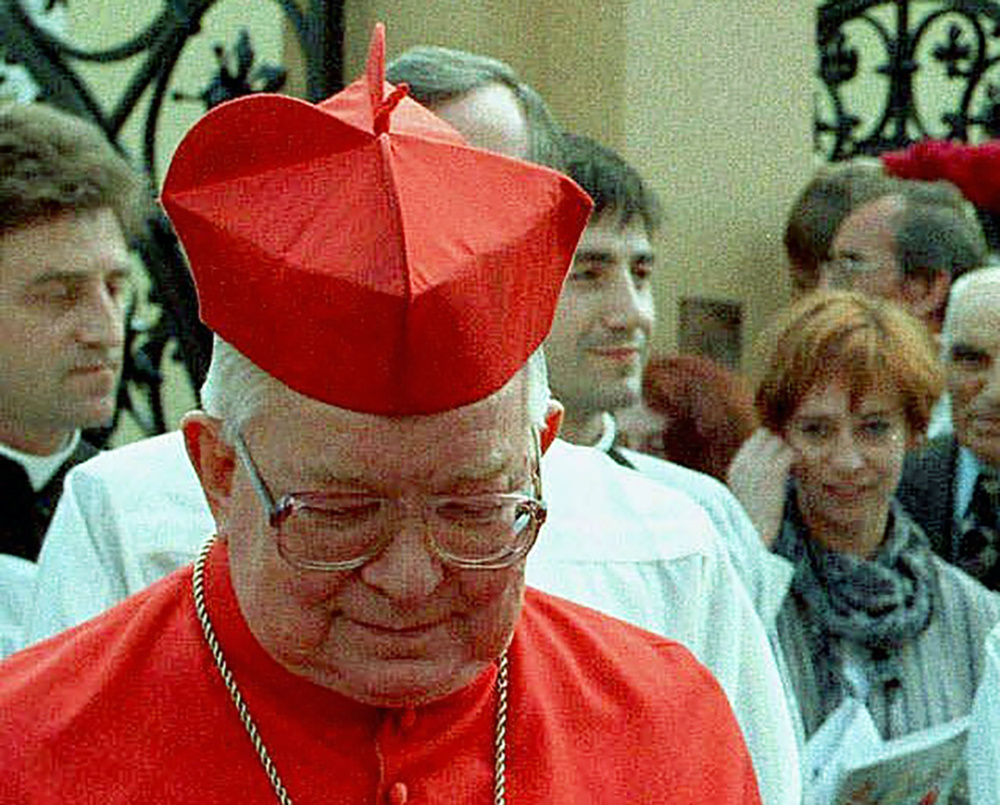Vatican City
RNS
For more than a week at the end of October, massive demonstrations swamped the streets of major cities in Poland as women marched against a court decision increasing abortion restrictions in the country.
The demonstrators, accusing the Roman Catholic Church of being a partner with Poland’s increasingly authoritarian conservative government, also showed their anger by disrupting Masses and invading cathedrals dressed in the red dresses and white bonnets of The Handmaid’s Tale. Signs recalling sexual abuse by Catholic clergy also became commonplace at the demonstrations.

In this 23rd February, 2001 file photo, US Cardinal Theodore Edgar McCarrick, archbishop of Washington, DC, shakes hands with Pope John Paul II during the General Audience with the newly appointed cardinals in the Paul VI hall at the Vatican. McCarrick was one of the three Americans on a record list of 44 new cardinals who were elevated in a ceremony at the Vatican on 21st February, 2001. PICTURE: AP Photo/Massimo Sambucetti/File photo.
The criticism, almost unimaginable just a few years ago in a country that counts itself the most Catholic nation in Europe, has been received by some as a wake-up call for the church.
“If the Polish bishops don’t realise that Poland, like the rest of the West, is mission territory, and if they don’t call their clergy and people to live the New Evangelization, Poland in 20 years could be the new Italy: a country with a visible facade of Catholic culture and history but a rather weak faith beneath,” Catholic commentator George Weigel told Religion News Service on Friday.

In this Sunday, 25th May, 1997, file photo, Wroclaw Metropolitan Cardinal, Henryk Gulbinowicz, in Wroclaw, Poland. Henryk Gulbinowicz, a prominent Polish cardinal, died on Monday 16th November, 2020, at the age of 97 only days after the Vatican imposed sanctions on him over accusations he had sexually abused a seminarian and allegedly covered up abuse in another case. PICTURE: AP Photo/Adam Hawalej/file photo.
GULBINOWICZ, POLISH CARDINAL ACCUSED OF ABUSE, DIES AT 97
Henryk Gulbinowicz, a prominent Polish cardinal who only days ago was sanctioned by the Vatican over accusations he had sexually abused a seminarian and covered up abuse in another case, has died. He was 97.
The Polish Bishops’ Conference said Gulbinowicz died Monday morning, adding in a brief statement: “Lord, give him eternal rest.”
Archbishop Stanislaw Gadecki, the head of the bishops’ conference, asked God to forgive Gulbinowicz.
“I am asking God in His mercy to forgive the deceased for causing suffering to those harmed, and pain to the community of believers,” Gadecki said in a statement.
“While unequivocally expressing disapproval of the sins committed, one must not forget about the good that many people shared through his life and ministry. May he rest in peace!”
Gulbinowicz was long viewed as a hero in Poland and was decorated with the nation’s highest honours. Under communism, he was considered one of the most important clerics helping the democratic opposition, hiding Solidarity activists in his church buildings in Wroclaw and helping to store its money.
But he died amid scandal.
Earlier this month, the Vatican’s embassy in Poland said Gulbinowicz, the retired Archbishop of Wroclaw, was forbidden from using his bishop’s insignia and participating in any religious celebrations or public events. He was also denied the right to have a cathedral funeral service or burial.
Recently, allegations were also made that Gulbinowicz was an informer for the communist-era secret security service.
A historian with the Institute of National Remembrance, a state historical body, has written that communist-era secret police had information about his homosexual relations with young people, suggesting that knowledge could have been a factor in why he was pressured to be an informer.
Days after the announcement this month of the Vatican sanctions, it was reported that Gulbinowicz was hospitalised in Wroclaw and was unconscious.
The hospital director, Wojciech Witkiewicz, told the news portal Onet that Gulbinowicz died of severe pneumonia and circulatory and respiratory failure.
Last year, prosecutors in Wroclaw opened an investigation into allegations against Gulbinowicz concerning sexual abuse of a seminarian in the 1980s, but they dropped the case because too much time had passed.
Gulbinowicz was also cited in a documentary in Poland about predator priests and coverup efforts. It alleged that Gulbinowicz saved a priest suspected of abusing of minors from arrest by vouching for him.
– VANESSA GERA, AP, Warsaw, Poland
Another blow to the Polish church came just days later, as the Vatican released its long-awaited report on the handling of the sexual abuse case of ex-cardinal Theodore McCarrick. Detailing how Pope John Paul II failed to act on the accusations against McCarrick to make him Archbishop of Washington and elevate him to cardinal, the report raises questions about the legacy of Poland’s first Catholic pontiff, its most recent saint and a hero of its struggle to escape the influence of Communism in the 1970s and ’80s.
“The legacy of John Paul II is in jeopardy now,” said Frederic Martel, journalist and author of In the Closet of the Vatican, a 2019 book that delved into the gay culture within the Vatican.
“Fighting Communism in Eastern Europe was a more important ideological goal than combating sexual abuse for John Paul II,” Martel added.
In addition to the McCarrick report, a Polish documentary that aired last week suggested that Cardinal Stanisław Dziwisz, John Paul II’s secretary, covered up numerous cases of sexual abuse in Poland and elsewhere. The McCarrick report mentions Dziwisz over 40 times.
In recent days, the fallout from the report has revived arguments that John Paul was made a saint too soon, only nine years after his death in 2005. There is no way to decanonise a saint in the Catholic Church, though feast days can be removed from the calendar.
According to the investigation, then-Archbishop of New York Cardinal John O’Connor and the Vatican envoy to the United States, Archbishop Agostino Cacciavillan, collected the evidence and testimonies against McCarrick and sent them to Pope John Paul II between 1999 and 2001, before McCarrick became DC’s archbishop in 2000.
The Vatican report tries to explain John Paul’s decision-making process with documents showing that several prelates concealed information and that some of the Pope’s closest advisers believed a letter from McCarrick in which he defended himself from the allegations.
John Paul had a long-standing relationship with McCarrick, the report shows, and the Pope’s experience in Poland – where clergy were often personally attacked by the Communist government to undermine their authority – likely had a strong impact on his decisions.
Many who know John Paul’s history have defended him, saying that the report’s account is too stark. “Media claims notwithstanding, that situation was very, very murky,” said Weigel, adding that a lack of clear evidence and McCarrick’s lies made the allegations as O’Connor presented them “less of a bright red flag than it’s being portrayed.
“To condemn John Paul II’s decision-making in 1999-2002 by what we know about McCarrick now is ahistorical and very likely agenda-driven,” Weigel said, “and to turn a 449 page report on a sexual predator, pervert, liar and manipulator into an indictment of another man, as too many have done, is, at the very least, strange.”
The McCarrick report has led to finger-pointing in the already polarized Catholic community, with conservative factions moving to protect their longtime standard-bearer, John Paul, as progressives hail the document as a victory for Francis, who ordered the report that largely exculpates him from responsibility in McCarrick’s continuation as cardinal after the accusations became better-known.
“I think the question of what Pope Francis knew in specific and when did he know it remains to be answered,” Weigel said, adding that Francis should have “insisted on, and enforced, a non-public life for the retired McCarrick.”
“But it must also be said that, confronted by the evidence presented by Cardinal Dolan in 2018, Pope Francis moved swiftly and decisively against McCarrick,” he added.
Francis accepted McCarrick’s resignation from the College of Cardinals in July, 2018, and ordered him to a “life of prayer and penance” while awaiting a canonical trial.
For Martel, the Vatican report proves that the 2018 letter by former Vatican representative to the United States Archbishop Carlo Maria Viganò, condemning the Vatican’s handling of McCarrick and asking for Francis’ resignation, “was a lie.”
If Catholic insiders disagree on which pontiff is most to blame for McCarrick’s embarrassment of the church, they agree that the Vatican report leaves many questions unanswered.
One such question is what, exactly, the church should do to restore faith in its ability to handle, and hopefully end, the abuse crisis.
Weigel said that reforming seminaries and promoting fraternal correction among bishops is essential to combating clergy abuse. “The clerical caste system and the ‘men’s club’ mentality among bishops that facilitated McCarrick’s self-promotion and deception remains to be fully dismantled,” he said.
Martel said it’s imperative that those who played a significant role in protecting and insulating McCarrick face canonical trials. “It’s the only way to avoid the legacy of John Paul II being destroyed,” he added.






